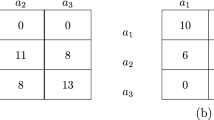Abstract
Participants of a decentralized system often use some local ranking informations, for selection of effective collaborations. We say that such systems are preference-based. For most practical types of preferences, such systems converge towards a unique stable configuration. In this paper, we investigate the speed and quality of the convergence process with respect to the model parameters. Our results provide an interesting insight into the design of system parameters, such as the number of connections or the algorithm for choosing new partners.









Similar content being viewed by others
Notes
The sign of the inequality is arbitrary. If marks stand for bandwidths, higher marks are preferred; if they mean latencies, lower marks are preferred; in this paper, we suppose w.l.o.g. that lower marks are preferred.
Remark: the initiative concept originally comes from this DA algorithm.
One can indeed prove that if G(s) admit at least one edge, the configuration is not stable (see for instance [21]).
Of course, we have empirically verified that H S(k) is well centered around its mean, which is the necessary condition to use Conjecture 1.
Gai et al. showed that symmetric marks can define all possible acyclic preferences, including global preferences [8]. Therefore it is natural to consider how close to global preferences a symmetric matrix is.
References
Cechlárová K, Fleiner T (2005) On a generalization of the stable roommates problem. ACM Trans Algorithms 1(1):143–156
Cohen B (2003) Incentives build robustness in bittorrent. In: P2PECON, Berkeley, June 2003
Diamantoudi E, Miyagawa E, Xue L (2004) Random paths to stability in the roommate problem. Games Econom Behav 48(1):18–28, July
Dijkstra EW (1974) Self-stabilizing systems in spite of distributed control. Commun ACM 17(11):643–644
Dolev S (2000) Self-stabilization. MIT Press, Cambridge
Eddington A (1928) The nature of the physical world. The Gifford Lectures
Fleiner T (2002) Some results on stable matchings and fixed points. Technical report TR-2002-08, Egerváry Research Group, Budapest
Gai A-T, Lebedev D, Mathieu F, de Montgolfier F, Reynier J, Viennot L (2007) Acyclic preference systems in p2p networks. In: Euro-Par, Rennes, 28–31 August 2007
Gai A-T, Mathieu F, Reynier J, De Montgolfier F (2007) Stratification in P2P networks, application to bittorrent. In: ICDCS, Toronto, 25–29 June 2007
Gai AT, Viennot L (2006) Incentive, resilience and load balancing in multicasting through clustered de bruijn overlay network (prefixstream). In: ICON, Singapore, 13–15 September
Gale D, Shapley LS (1962) College admissions and the stability of marriage. Am Math Mon 69:9–15
Irving R (1985) An efficient algorithm for the stable roommates problem. J Algorithms 6:577–595
Irving R, Leather P, Gusfield D (1987) An efficient algorithm for the “optimal” stable marriage. J Assoc Comput Mach 34(3):532–543
Irving RW, Manlove D, Scott S (2000) The hospitals residents problem with ties. In: SWAT ’00. Springer, London, pp 259–271
Irving RW, Manlove DF (2002) The stable roommates problem with ties. J Algorithms 43(1):85–105
Kawahara Y, Aoyama T, Morikawa H (2004) A peer-to-peer message exchange scheme for large-scale networked virtual environments. Telecommun Syst 25(3)
Keller J, Simon G (2003) Solipsis: a massively multi-participant virtual world. In: PDPTA, Las Vegas, June 2003
Lebedev D, Mathieu F, Viennot L, Gai A-T, Reynier J, De Montgolfier F (2007) On using matching theory to understand p2p network design. In: INOC, Spa, 22–25 April 2007
LeFessant F, Handurukande S, Kermarrec A, Massoulie L (2004) Clustering in peer-to-peer file sharing workloads. In: IPTPS, La Jolla, 26–27 February 2004
Lin Y-J, Guo K, Paul S (2002) Sync-ms: synchronized messaging service for real-time multi-player distributed games. In: ICNP, Paris, 12–15 November 2002
Mathieu F (2007) Upper bounds for stabilization in acyclic preference-based systems. In: International symposium on stabilization, safety, and security of distributed systems (SSS), LNCS 4838. Springer, Berlin Heidelberg New York, pp 372–382, November
Mertens S (2005) Random stable matchings. J Stat Mech Theor Exp P10008, doi:10.1088/1742-5468/2005/10/P10008
Pittel B (1993) The stable roommates problem with random preferences. Ann Probab 21(3):1441–1477
Roth AE (1984) The evolution of the labor market for medical interns and residents: a case study in game theory. J Polit Econ 92(6):991–1016
Roth AE, Sonmez T, Utku Unver M (2005) Pairwise kidney exchange. J Econ Theory 125(2):151–188, December
Rowstron A, Druschel P (2001) Pastry: scalable, decentralized object location, and routing for large-scale peer-to-peer systems. Lect Notes Comput Sci 2218:329–350
Sripanidkulchai K, Maggs B, Zhang H (2003) Efficient content location using interest-based locality in peer-to-peer systems. In: INFOCOM, San Franciso, 30 March– 3 April 2003
Tan JJM (1991) A necessary and sufficient condition for the existence of a complete stable matching. J Algorithms 12(1):154–178
Author information
Authors and Affiliations
Corresponding author
Rights and permissions
About this article
Cite this article
Mathieu, F. Self-stabilization in preference-based systems. Peer-to-Peer Netw. Appl. 1, 104–121 (2008). https://doi.org/10.1007/s12083-008-0009-3
Received:
Accepted:
Published:
Issue Date:
DOI: https://doi.org/10.1007/s12083-008-0009-3




